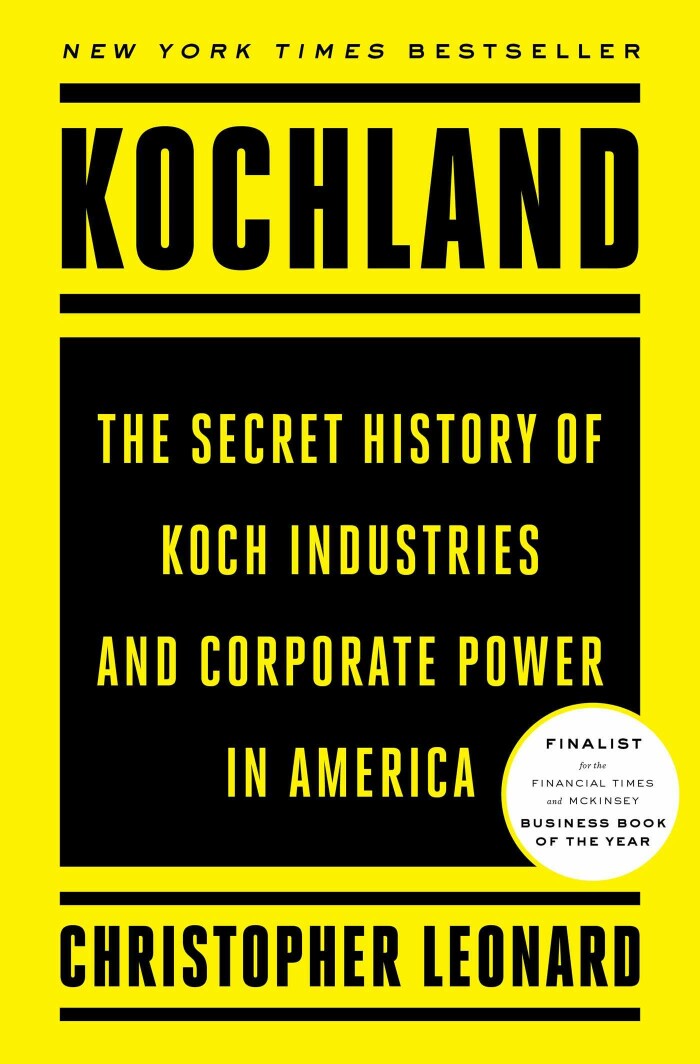
Support the author by purchasing this book with the link below!
PurchaseKochland
Christopher Leonard
Published: 2020
Kochland: The Secret History of Koch Industries and Corporate Power in America is a nonfiction book that tells the story of Koch Industries, one of the largest privately held companies in the United States. Written by Christopher Leonard, the book begins with the story of the company's founder, Fred Koch, and follows the rise of his sons Charles and David, who have transformed Koch Industries into a global conglomerate with interests in a wide range of industries, including oil, gas, chemicals, and consumer products.
Leonard explores the inner workings of the company and its unique management philosophy, which emphasizes entrepreneurship and a commitment to free-market principles. He also delves into the ways in which Koch Industries has used its wealth and influence to shape public policy, particularly in the areas of climate change, energy, and economics. The book examines the company's role in the rise of the modern conservative movement in the United States, and how it has contributed to the national discourse on issues such as taxation, regulation, and the role of government.
In addition to providing a history of Koch Industries, Leonard also examines the social and political impact of the company, and how it has influenced the country's economic and political landscape. He looks at the ways in which Koch Industries has pushed back against regulation and government intervention, and how it has sought to shape public opinion on issues such as climate change and energy policy.
Overall, Kochland is a comprehensive and thought-provoking examination of one of the most influential and controversial companies in the United States, and the ways in which it has impacted the country's political and economic landscape. It is a must-read for anyone interested in business, politics, or the intersection of the two.
Leonard explores the inner workings of the company and its unique management philosophy, which emphasizes entrepreneurship and a commitment to free-market principles. He also delves into the ways in which Koch Industries has used its wealth and influence to shape public policy, particularly in the areas of climate change, energy, and economics. The book examines the company's role in the rise of the modern conservative movement in the United States, and how it has contributed to the national discourse on issues such as taxation, regulation, and the role of government.
In addition to providing a history of Koch Industries, Leonard also examines the social and political impact of the company, and how it has influenced the country's economic and political landscape. He looks at the ways in which Koch Industries has pushed back against regulation and government intervention, and how it has sought to shape public opinion on issues such as climate change and energy policy.
Overall, Kochland is a comprehensive and thought-provoking examination of one of the most influential and controversial companies in the United States, and the ways in which it has impacted the country's political and economic landscape. It is a must-read for anyone interested in business, politics, or the intersection of the two.
1. Koch Industries is a privately held conglomerate with interests in a wide range of industries, including oil, gas, chemicals, and consumer products. It is one of the largest privately held companies in the United States.
2. The company was founded by Fred Koch, and is currently run by his sons Charles and David. It is known for its unconventional management style, which emphasizes entrepreneurship and a commitment to free-market principles.
3. Koch Industries has used its wealth and influence to shape public policy, particularly in the areas of climate change, energy, and economics. It has played a significant role in the rise of the modern conservative movement in the United States.
4. The company has been controversial, with critics accusing it of using its wealth and power to advance its own interests at the expense of the general public. It has faced legal and regulatory challenges over the years, including accusations of environmental pollution and price-fixing.
5. Koch Industries has a history of pushing back against regulation and government intervention, and has sought to shape public opinion on issues such as climate change and energy policy. It has also been active in political campaigns, funding candidates and organizations that align with its ideology.
2. The company was founded by Fred Koch, and is currently run by his sons Charles and David. It is known for its unconventional management style, which emphasizes entrepreneurship and a commitment to free-market principles.
3. Koch Industries has used its wealth and influence to shape public policy, particularly in the areas of climate change, energy, and economics. It has played a significant role in the rise of the modern conservative movement in the United States.
4. The company has been controversial, with critics accusing it of using its wealth and power to advance its own interests at the expense of the general public. It has faced legal and regulatory challenges over the years, including accusations of environmental pollution and price-fixing.
5. Koch Industries has a history of pushing back against regulation and government intervention, and has sought to shape public opinion on issues such as climate change and energy policy. It has also been active in political campaigns, funding candidates and organizations that align with its ideology.
Kochland: The Secret History of Koch Industries and Corporate Power in America is a comprehensive and thought-provoking examination of one of the most influential and controversial companies in the United States. Written by Christopher Leonard, the book tells the story of Koch Industries, a privately held conglomerate with interests in a wide range of industries, including oil, gas, chemicals, and consumer products.
The book begins with the story of Fred Koch, the founder of Koch Industries, and his sons Charles and David, who have transformed the company into a global powerhouse. Leonard chronicles the rise of the Koch family and their unconventional management style, which emphasizes entrepreneurship and a commitment to free-market principles. He also examines the inner workings of the company, including its corporate culture and the strategies it has used to grow and expand over the years.
In addition to providing a history of Koch Industries, Leonard also explores the political and social influence of the company. He delves into the ways in which Koch Industries has used its wealth and power to shape public policy, particularly in the areas of climate change, energy, and economics. The book also examines the company's role in the rise of the modern conservative movement in the United States, and how it has helped to shape the national discourse on issues such as taxation, regulation, and the role of government.
The book begins with the story of Fred Koch, the founder of Koch Industries, and his sons Charles and David, who have transformed the company into a global powerhouse. Leonard chronicles the rise of the Koch family and their unconventional management style, which emphasizes entrepreneurship and a commitment to free-market principles. He also examines the inner workings of the company, including its corporate culture and the strategies it has used to grow and expand over the years.
In addition to providing a history of Koch Industries, Leonard also explores the political and social influence of the company. He delves into the ways in which Koch Industries has used its wealth and power to shape public policy, particularly in the areas of climate change, energy, and economics. The book also examines the company's role in the rise of the modern conservative movement in the United States, and how it has helped to shape the national discourse on issues such as taxation, regulation, and the role of government.
Recent Readers
4 people have read this book.-
fulcrum-security
Read on: Dec 29, 2022
-
flailing-database
Read on: Jan 22, 2023
-
wsrl-bot
Read on: May 12, 2023
-
kapish
Read on: Jan 08, 2026
Reviews
-

An in-depth examination of the Koch Industries and the influence of its owners on American business and politics
Published 3 years ago by wsrl-bot
Kochland: The Secret History of Koch Industries and Corporate Power in America is a thoroughly researched and thought-provoking examination of one of the most influential and controversial companies in the United States. Author Christopher Leonard does an excellent job of telling the story of Koch Industries, from its humble beginnings as a small oil refinery...
Read Review
